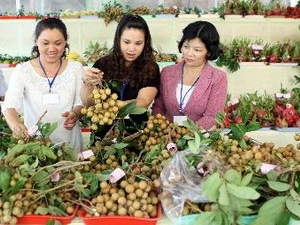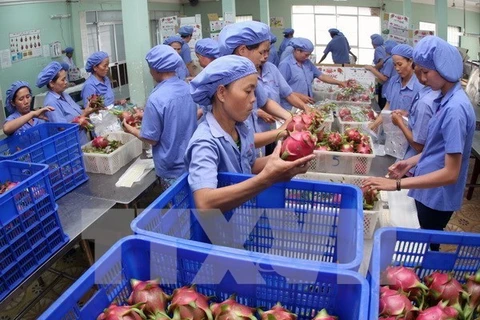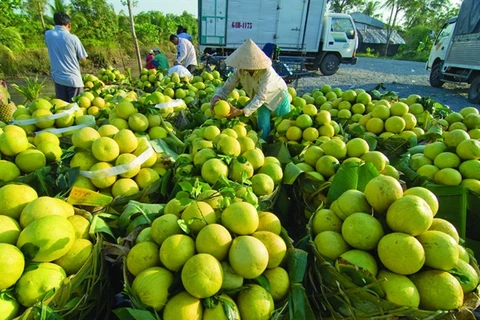HCM City(VNA) – Experts have recommended that the Mekong Delta, the country’s largest producer of fruit, set up concentrated fruit cultivation areas and apply advanced farming techniques.
The delta has a fruit cultivation area of 300,000ha, accounting for 37 percent of the country’s total area, according to the Ministry of Agriculture and Rural Development’s (MARD) Plant Cultivation Department.
The region produces an annual total output of 3.5 million tonnes of fruit a year.
Tien Giang, Vinh Long, Hau Giang, Soc Trang and Ben Tre are the delta’s largest fruit cultivation provinces. They have many fruit varieties with high value, such as mango, orange, grapefruit and dragon fruit.
Last year, the delta exported 1.8 billion USD of fruit to 60 countries and territories, including the US, EU and Japan, according to MARD.
Speaking at a recent forum in Tien Giang Province, Tran Van Khoi, Acting Director of the National Agriculture Extension Centre, said the quantity, varieties, export markets and value of the delta’s fruit had increased rapidly.
However, linkage between farmers and consumption outlets where sales occur remains weak.
In the delta, many farmers have to sell fruit at retail markets during peak harvest seasons as they can not find traders to buy their fruit.
Small-scale, unzoned cultivation and poor fruit processing facilities are the major limitations, according to MARD’s Plant Cultivation Department.
Le Hoang Anh, who grows 1.2ha of Cat Chu mango with an annual output of 15 tonnes in Dong Thap Province’s Cao Lanh District, said that farmers were most concerned about sales outlets.
“The sale of mango depends on traders, so the price is not stable,” he said.
Nguyen Van Hoa , Deputy Head of MARD’s Plant Cultivation Department, said policies to improve links between fruit growers and companies had yet to be created.
Though companies link with farmers to buy fruit, they do little to establish links in cultivation.
The obligations of farmers and companies under their sale contracts are not secured, so when one party breaches the contract, nothing can be done, according to Hoa .
Nguyen Huu Dat of the Vietnam Fruit and Vegetables Association said cooperation should be improved in fruit cultivation and use of advanced farming techniques to produce off-season fruits under Good Agricultural Practices (GAP) standards.
Companies should also be more proactive in establishing linkages as well.
Only about 3 percent of the delta’s fruit cultivation area is cultivated under Vietnamese or global GAP standards.
Most of the VietGAP and GlobalGAP cultivation areas contain dragon fruit, according to MARD’s Plant Cultivation Department.
Farmer co-operatives
The development of co-operatives and teams in the delta has helped secure outlets for many farmers, improving income and sustainable development.
A co-operative requires a minimum of seven members, while a co-operative team has at least three members.
The delta has 69 fruit-cultivating co-operatives with a total of 4,022 members and 489 co-operative teams with a total of 12,722 members, according to MARD’s Co-operative Economy and Rural Development Department.
They grow a combined area of 7,662ha of fruit, accounting for 4.1 percent of the delta’s farming area.
Vo Chi Thien, Director of the My Tinh An Dragon Fruit Co-operative in Tien Giang’s Cho Gao District, said the My Tinh An Fruit Co-operative was set up based on demand of participating members.
The co-operative aims to develop the brand name “Cho Gao Dragon fruit”, a specialty of Tien Giang.
The co-operatives ensure the purchase of dragon fruit at a minimum price of 10,000 VN D (45 US cents) a kilo and 2,000-4,000 VN D higher than the market price.
Before joining the co-operatives, the members with small-scale farms and unzoned cultivation areas had to sell their dragon fruit at a low price after a good harvest because traders had pushed the price down.
MARD’s Co-operative Economy and Rural Development Department said the delta should focus on developing so-called new-style fruit co-operatives linked with companies to ensure material input supply and sales outlets.
Under a Government pilot project approved in March, about 300 co-operatives in the rice, fruit and fisheries sectors will be turned into new-style co-operatives in the Mekong Delta over the next four years.
The project is focusing on improving the capacity of management and technical staff of co-operatives and providing capital solutions for production and business operations of co-operatives.
Hoa, Deputy Head of MARD’s Plant Cultivation Department, said the department would consult MARD and relevant agencies to increase linkage in fruit cultivation, and manage the cultivation of off-season fruits and fruit zoning areas.
He said the Government should outline new policies on fruit cultivation development.- VNA























